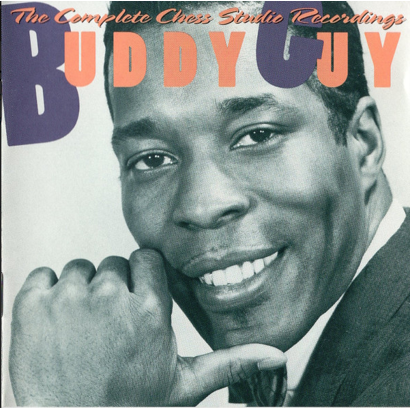Essential Blues Recording
Buddy Guy – Chicago Blues Icon At His Unsurpassed Greatness
Buddy Guy – The Complete Chess Studio Recordings – Chess/MCA CHD2-9337
The factions can be profoundly split when it comes to Buddy Guy. Voluminous blues enthusiasts favor the 1960s period Buddy Guy, where his guitar work was based to a greater degree upon touch, tone, and more controlled volume, which is notably different than the auditory attacks most frequently posed in his modern-day recordings. Though, that row may lay upon a wobbly foundation, as there is no refuting the at-times hysterical vocal and guitar assaults that Buddy provided during his Chess Records era. That’s forever been a chunk of the attraction of Buddy Guy; the fire.
The counter Buddy Guy camp appears to find its roots dating to the commencement of Buddy’s partnership with the Silvertone record imprint, a collaboration that launched in 1991. Buddy’s Silvertone recordings were fashioned in such a way as to carry the bluster, boldness, and volume that he delivered in performance to his rabid audiences. Countless blues fans want to experience and “feel” the indisputable clout of a contemporary Buddy Guy show, and the Silvertone recordings convey that sonic scope. However, the Silvertone output was not in actuality the original outlet to offer that aural gust. Early in the 1980s, Buddy produced recordings for the JSP label, and most especially, his powerful 1982 release, D.J. Play My Blues, remains a weighty exemplar of Buddy Guy summarized at his ideally most feral.
Irrespective of which Buddy Guy bloc one drops into, his The Complete Chess Studio Recordings two-CD set is singularly one of the chronicled highpoints of his extensive career, an amassing of his Chess Records label blues that have endured the test of time, and grants all that Buddy Guy should be recognized and touted for, with the aforementioned overall more controlled touch, tone, and volume that his early career brought, though the flashes of high energy are there without doubt.
This tremendous compilation, over the expanse of two CDs, lays 47 tracks bare for the listener to consider the impact Buddy Guy has had on not only Chicago and its blues landscape, but that of the total of the genre. Released in 1992, this collection finds Guy and his blues conceptualizations realized not only via his prodigious skill sets, but by the supporting casts that the Chess brothers utilized to bring out the best of Guy. Familiar names such as Fred Below, Jack Myers, Little Brother Montgomery, Junior Wells, Otis Spann, Lefty Bates, Lafayette Leake, Abb Locke, Lacey Gibson, Clifton James, Sonny Boy Williamson II, Robert Nighthawk, Leonard Caston, Gene Barge, Matt Murphy, along with so many more participated when Guy laid-down these tracks during the 1960-1967 timeframe.
When taken as a set, these cuts highlight Guy as both a master in full control of his expressive best, his vast guitar attributes and vocals often subdued and feeling (I still don’t think that he gets enough kudos for these traits), while also offering early glimpses of what would later become his trademark audio outbursts. This is simply a primer on Buddy Guy as he began to unfurl.
In the early 1990s, I traveled to see Guy perform at the first iteration of his Buddy Guy’s Legends club in Chicago’s South Loop area. The venue was packed to the rafters. And though I have been to countless musical proceedings on all scales throughout my life, I know that I’ve never had a musical encounter that would rival Guy’s show that night for the exhilaration of the audience, the sheer ecstasy and frenzied conveyance of the artist (it was very obvious how much Guy was enjoying himself), the range of sentiments proffered via the music, and the sum of the theater of the occasion. I’ve witnessed Guy various times over the years, but there is nothing that will ever come close to the global satisfaction and celebration of that evening.
Buddy Guy; indeed! What a concept! Highly essential a collection!
